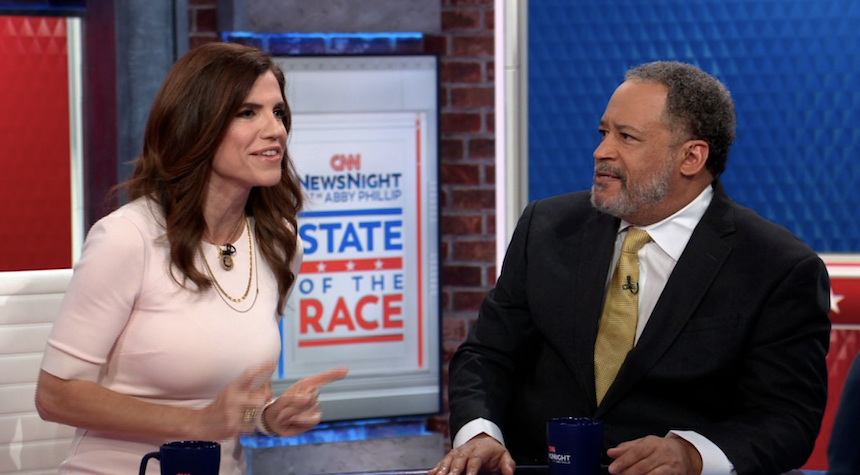Michael Eric Dyson Rejects Claims of Flirtation with Rep. Nancy Mace, Defends Intent of Text Messages
In a recent development that has sparked discussion across political spectrums, Michael Eric Dyson, a noted academic and commentator, found himself at the center of controversy after a text exchange with Rep. Nancy Mace (R-S.C.) was made public. The incident began during an appearance on CNN where Dyson and
In a recent development that has sparked discussion across political spectrums, Michael Eric Dyson, a noted academic and commentator, found himself at the center of controversy after a text exchange with Rep. Nancy Mace (R-S.C.) was made public. The incident began during an appearance on CNN where Dyson and Mace engaged in a heated exchange regarding the pronunciation of Vice President Kamala Harris's name, with Dyson arguing that mispronunciations could be seen as a form of disrespect linked to racial biases.
SHAME ON THESE BLACK MEN: someone tell me why the hell Michael Eric Dyson (@MichaelEDyson) and Keith Boykin (@keithboykin) is sitting on CNN (@CNN) crying about Kamala Harris when they know damn well Black Americans pronounce Kamala Harris’s the same way Rep. Nancy Mace… pic.twitter.com/2l6LHuknun
— Sir Maejor 🇺🇸 (@SirMaejorATL) August 16, 2024
Following this televised debate, Rep. Mace revealed text messages she received from Dyson, which she described as "flirty." The messages, entered into the Congressional Record by Mace, included Dyson commenting on their appearance together in photos, with one message reading, "Don’t tell anybody we look good together," accompanied by a kissy emoji. Mace interpreted these messages as Dyson attempting to flirt with her, which she found inappropriate given the context of their public disagreement.
— Nancy Mace (@NancyMace) September 19, 2024
Dyson, however, vehemently denied any flirtatious intent in his communications. In a series of statements and social media posts, Dyson explained that the text was meant in jest and as a gesture of civility following their contentious on-air moment. He emphasized his attempt to be "nice" to Mace, suggesting that his comments were intended to diffuse tension rather than escalate it. Dyson further clarified his position on "The View," doubling down on his criticism of Mace's remarks about Harris but insisting that his personal interaction with Mace was free from any romantic overtures.
NEW: Rep. Nancy Mace enters text messages into the record of a CNN commentator hitting on her after calling her racist during a live CNN segment.
— Collin Rugg (@CollinRugg) September 19, 2024
CNN commentator & author Michael Dyson allegedly begged Mace for photos.
"After my CNN interview, he begged me for photos... after… pic.twitter.com/UKE82z0rQh
The controversy intensified when Dyson accused Mace of misrepresenting his intentions, calling her actions a smear campaign against him. He criticized Mace's use of "white women's tears" as a defensive mechanism, which drew accusations of racism and misogyny from Mace and her supporters. Mace responded by defending her interpretation of the messages and criticized Dyson for what she perceived as an attempt to dismiss her feelings by attributing them to her race and gender.
Michael Eric Dyson comes out swing after Nancy Mace accused him of trying to flirt with her
— RidinwithKamala (@tltown2019) September 21, 2024
Your attempt is sad and sorry, but you’re bigoted and racist attempt will not succeed,” Dyson remarked. “There was no attempt to do anything but to be gracious to you, but you have proved… https://t.co/CNNVT3HEYb pic.twitter.com/pAzszDNbVN
This episode has ignited discussions on several fronts, including the nature of public discourse, the intersection of race, gender, and politics, and the personal interactions between public figures with opposing views. Critics of Dyson argue that his comments, regardless of intent, were inappropriate, while supporters see Mace's response as an overreaction meant to deflect from the original discussion on racial sensitivity.
As the debate continues, it reflects broader societal conversations about how personal interactions among public figures are conducted and interpreted, especially across political and racial divides. Dyson's defense hinges on context and intent, whereas Mace's criticism focuses on the perceived inappropriateness of the messages, highlighting the complex dynamics of communication in today's politically charged environment.




